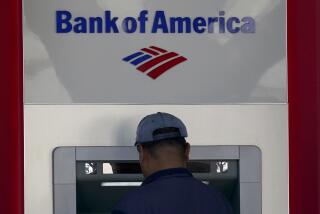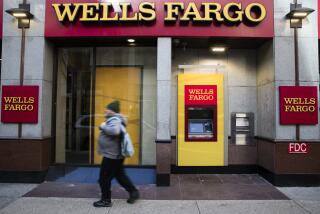B of A Facing Decision on Dividend Cut : Analysts See Possible Regulatory Pressure After Recent Losses
- Share via
BankAmerica directors will meet Monday to make one of the most difficult decisions they’ve faced in recent years--whether to cut or eliminate the quarterly dividend on the bank company’s common shares.
The painful decision follows the firm’s $338-million second-quarter loss, the company’s first deficit since the 1930s and the second-largest quarterly loss in U.S. banking history. Analysts said BankAmerica may be under pressure from federal bank regulators to cut the dividend to reflect the huge loss and preserve the company’s equity position.
Major Reorganization
Meanwhile, BankAmerica, parent of Bank of America, on Tuesday announced a major reorganization of its world banking division, including a reduction of 2,000 jobs, or 10% of the unit’s total work force, over the next 12 to 18 months.
The long-awaited move is part of a companywide restructuring aimed at reducing costs and dropping unprofitable lines of business. The cuts announced Tuesday will save $60 million, according to bank estimates.
Vice Chairman Robert Frick said in an interview that the company would try to achieve the work-force reductions through attrition, reassignment and resignation. But he acknowledged that layoffs were possible in U.S. offices and likely in foreign units.
He also said the action will mean elimination of the company’s presence in a number of countries and the departure of some senior executives. He would not name the countries or the individuals involved.
Analysts Differ on Cut
The world banking division represents about half of the bank holding company’s $119 billion in assets. It includes most of the bank’s operations outside of California.
The restructuring will bring an added emphasis to what the bank calls “network” relationships with major multinational customers.
B of A will offer clients such as IBM a full range of services, including electronic payments and currency trading through its offices in 76 countries.
Executive Vice President Mont E. McMillen Jr. was named to manage the newly formed Network Markets unit.
Banking industry analysts differ on whether BankAmerica will or should take the difficult step of reducing the dividend, which now costs $57.7 million per quarter. Some contend that B of A can’t afford to maintain the 38-cents-a-share dividend and shouldn’t pay it. Others argue that it can’t afford not to make the payout because of the devastating impact such a move would have on the bank’s vast number of individual shareholders.
The bank has paid the 38-cent quarterly dividend since 1981 despite declining earnings.
“Prudent financial management dictates a cut,” said George M. Salem, chief bank stock analyst at the Wall Street firm of Donaldson, Lufkin & Jenrette.
Salem’s recommendation comes despite his view that reducing the dividend would be a “punishment” for shareholders and cause a sharp drop in share prices.
Board Alone Will Decide
“They should pay it,” countered Werner Keller, chief of research for the Los Angeles brokerage house Bateman Eichler, Hill Richards.
“Bank of America is a quasi-public utility when it comes to the dividend. They have a very large shareholder franchise to whom a cut would be an announcement” that the bank was in serious trouble.
At B of A headquarters in San Francisco, the dividend question is extremely sensitive. A spokesman said the decision belonged to the board of directors alone.
“It’s a decision they make based on their outlook for the future prospects of the corporation,” the spokesman said. “We have no comment beyond that.”
Many Individual Holders
Bank of America differs from its major bank peers in its large number of individual shareholders. At the nation’s 10 biggest banks, an average of 58% of common shares are held by institutions--other corporations, large trusts, pension funds and insurance firms. But only a third of BankAmerica’s common shares are held by institutions. The remaining two-thirds, 100 million shares, are held by 160,000 individual shareholders.
The dividend has not been reduced or eliminated in recent memory, and thousands of the bank’s shareholders depend on the quarterly dividend check to meet living expenses.
“It’s the classic widows’ and orphans’ stock,” said analyst William J. Welsh of the investment house Sanford C. Bernstein & Co. “It’s a horrible thought for management to even consider cutting the dividend. But the fact that they’ve mentioned it leads me to believe it’s quite possible.
“My guess is there’s pressure coming from outside the bank, quite possibly from the regulators, to trim the dividend. There’s intense pressure from both sides.”
Full-Scale Audit
Examiners from the Office of the Comptroller of the Currency, which regulates national banks, are currently conducting a full-scale audit of Bank of America. They reportedly played a role in the bank’s huge second-quarter set-aside for bad loans and are thought to be taking unusual interest in B of A’s dividend policy.
Bank regulators do not comment on ongoing examinations.
Analyst Lawrence C. Cohn of Dean Witter Reynolds predicted that the bank would pay the full dividend, even though it would mean dipping into equity to fund it.
“From a pure economic standpoint, they shouldn’t pay a dividend. But banks are different. So much of banks’ strength depends on public perception. B of A will find the cash to pay it because it’s important to make a showing of strength.”
Confidence Affected
Cohn said the B of A case poses a dilemma for regulators. They are charged with maintaining the safety and soundness of the nation’s banking system and thus feel obligated to urge a bank that is losing money to cut its dividend.
On the other hand, if B of A were to trim its dividend under pressure from the government, confidence in the nation’s largest bank on the part of tens of thousands of small investors would be adversely affected.
“There is no history of them (regulators) interfering in a bank’s dividend decision,” Cohn said. “To take a strong position against paying a dividend would be something new. On the other hand, the Comptroller has been much more aggressive than usual in dealing with this bank.”
More to Read
Inside the business of entertainment
The Wide Shot brings you news, analysis and insights on everything from streaming wars to production — and what it all means for the future.
You may occasionally receive promotional content from the Los Angeles Times.










